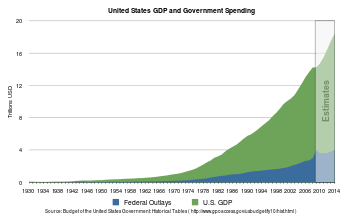
It’s Donald Trump’s first work week as president of the United States and already, The Hill reports, he “may be headed into a big fight with Republican lawmakers with his plans for dramatic cuts to federal spending.”
Dramatic cuts? Not really: “Team Trump is relying on proposals outlined last year by the Heritage Foundation in its ‘Blueprint for Balance: a federal budget for 2017.’”
The Heritage plan is weak tea. It doesn’t even claim to cut overall government spending, but rather to merely “control the growth” of that spending. And its claim to balance the budget by 2023 is pure sleight of hand. The “primary balance” it mentions excludes interest on existing government debt, which is fast approaching the half a trillion dollars per year mark.
The developing Trump plan is the usual tinkering around the edges, searching for “waste, fraud and abuse” in “discretionary spending.” Baby steps like that will never bring the budget into balance, but they’re still too much for Congress.
“Discretionary spending” is politicianese for “spending Congress uses to buy votes back home.”
US Senator Lisa Murkowski (R-AK) and US Representative Don Young (R-AK) blew their stacks when they learned that something called the “essential air program” — a federal subsidy for the rural airports so important to their state — might be on the chopping block.
Mississippi Republicans don’t want to lose one of two federal “catfish inspection programs” that hand out artificial government and regulatory compliance jobs to their constituents back home.
A few Republicans will likely peel away from their party to save some discretionary programs usually associated with Democrats: Legal services for the poor, arts funding, and state-subsidized media.
And then of course there’s the single biggest federal budget line: “Defense,” politicianese for “government contracts for expensive planes, ships and weapons systems that keep my campaign contributors happy and let me artificially inflate my district’s employment statistics.”
If you’re not serious about cutting “defense” spending, you’re not serious about cutting spending. The Trump White House and congressional Republicans want to increase, not cut, that budget line.
Some Republicans point out that a balanced budget is impossible without reforming “non-discretionary” spending — Social Security, Medicare and so forth. They’re right. But they’re also making excuses: They won’t cut the spending that it’s easy to cut unless they can also cut the spending that it’s hard to cut, and come hell or high water they’ll find a way to lose the latter fight.
We’ve been here before. Ronald Reagan came into office with plans to balance the budget while cutting taxes and increasing military spending by going after “waste, fraud and abuse,” too. It didn’t work then and it won’t work now.
One difference: Reagan could fob some of the blame off on a Democratic House of Representatives. Trump doesn’t enjoy that luxury. The Republican Party owns the House, and the Senate, and the White House — they own the entire federal government. For at least the next two years, that means they also own 100% of the coming fiscal failure.
Thomas L. Knapp (Twitter: @thomaslknapp) is director and senior news analyst at the William Lloyd Garrison Center for Libertarian Advocacy Journalism (thegarrisoncenter.org). He lives and works in north central Florida.
PUBLICATION HISTORY
- “Reagan Redux? The Federal Budget Battle Shapes Up,” by Thomas L. Knapp, Ventura County, California Citizens Journal, 01/24/17
- “Reagan Redux? The Federal Budget Battle Shapes Up,” by Thomas L. Knapp, OpEdNews, 01/30/17
- “Reagan redux? The federal budget battle shapes up,” by Thomas L. Knapp, Sonoran News [Arizona], 02/01/17


